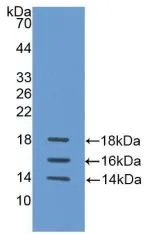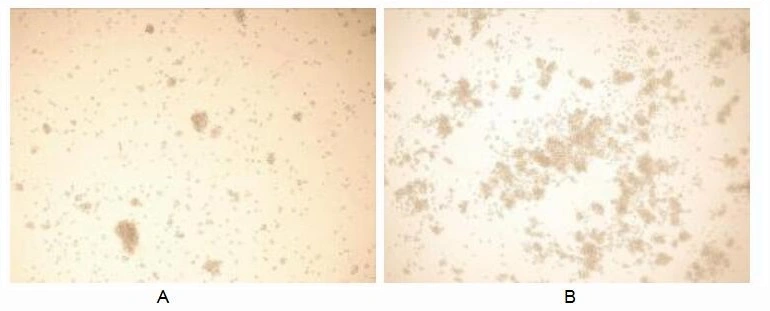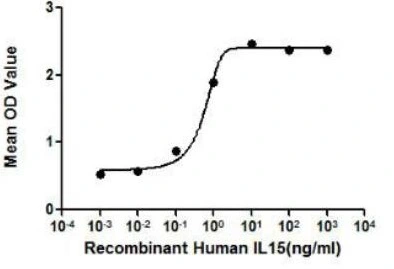
WB analysis of GTX00088-pro Human IL15 protein (active).
Human IL15 protein, His tag (active)
GTX00088-PRO
ApplicationsFunctional Assay
Product group Proteins / Signaling Molecules
Protein IDP40933
Overview
- SupplierGeneTex
- Product NameHuman IL15 protein, His tag (active)
- Delivery Days Customer9
- Application Supplier NoteInterleukin 15 (IL15) is a widely expressed cytokine that is structurally and functionally related to IL2, which plays an important role in many immunological diseases. IL15 also regulates T and natural killer (NK) cell activation and proliferation. To test the effect of IL15 on cells proliferation of human T lymphocyte cells, Jurkat cells were seeded into triplicate wells of 96-well plates at a density of 1x104 cells/well in RPMI-1640 with the addition of various concentrations of IL15. After incubated for 72h, cells were observed by inverted microscope and cell proliferation was measured by Cell Counting Kit-8 (CCK-8). Briefly, 10 microl of CCK-8 solution was added to each well of the plate, then the absorbance at 450nm was measured using a microplate reader after incubating the plate for 1-4 hours at 37C. Cell proliferation of Jurkat cells after incubation with IL15 for 72h observed by inverted microscope.
- ApplicationsFunctional Assay
- CertificationResearch Use Only
- ConjugateUnconjugated
- Gene ID3600
- Target nameIL15
- Target descriptioninterleukin 15
- Target synonymsIL-15, interleukin-15
- Protein IDP40933
- Protein NameInterleukin-15
- Scientific DescriptionThe protein encoded by this gene is a cytokine that regulates T and natural killer cell activation and proliferation. This cytokine and interleukine 2 share many biological activities. They are found to bind common hematopoietin receptor subunits, and may compete for the same receptor, and thus negatively regulate each others activity. The number of CD8+ memory cells is shown to be controlled by a balance between this cytokine and IL2. This cytokine induces the activation of JAK kinases, as well as the phosphorylation and activation of transcription activators STAT3, STAT5, and STAT6. Studies of the mouse counterpart suggested that this cytokine may increase the expression of apoptosis inhibitor BCL2L1/BCL-x(L), possibly through the transcription activation activity of STAT6, and thus prevent apoptosis. Alternatively spliced transcript variants of this gene have been reported. [provided by RefSeq, Feb 2011]
- Storage Instruction-20°C or -80°C,2°C to 8°C
- UNSPSC41116120
- SpeciesHuman




